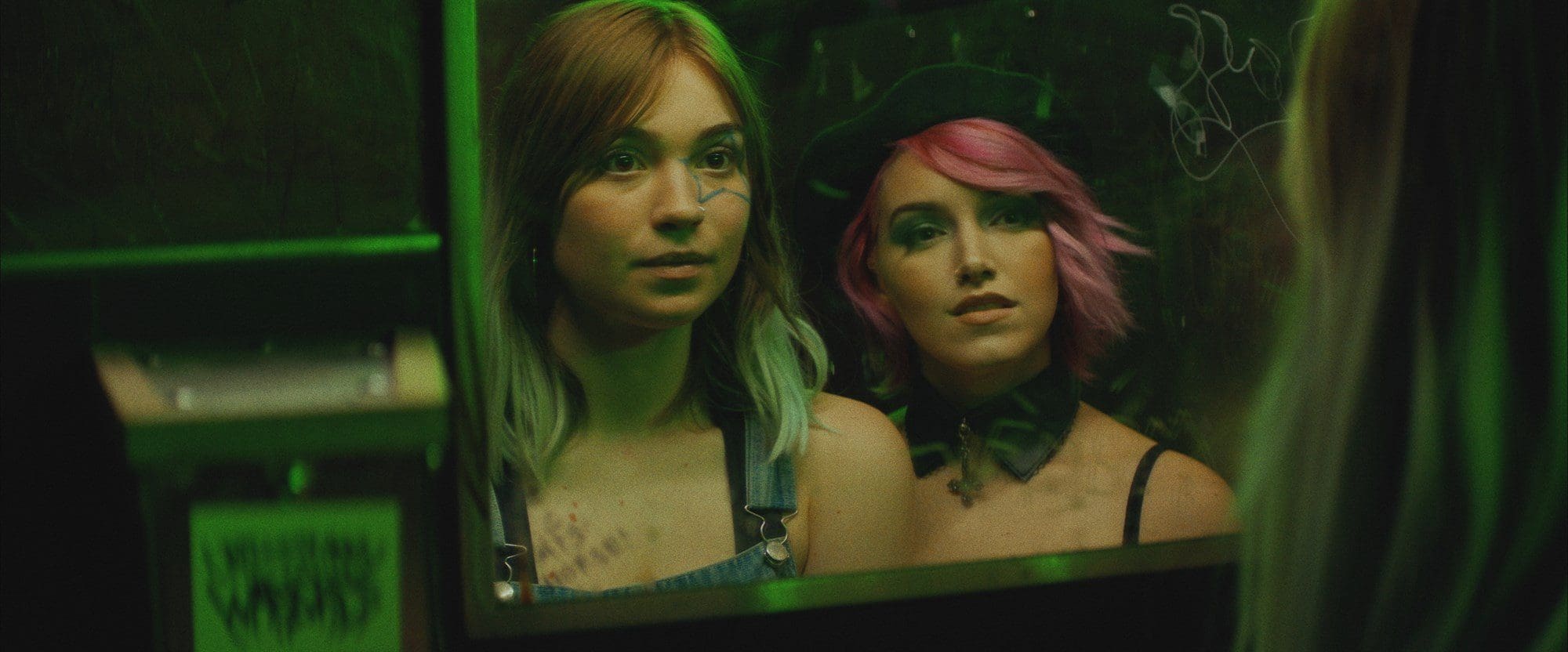
Directors Ori Segev and Noah Dixon‘s new film Poser initially reads like a comedy. Set in Columbus, Ohio’s underground music scene (yes, that apparently exists), it follows Lennon (Sylvie Mix), a wall flower type who tries to become part of the scene by making a podcast about its bands.
At first, Dixon’s script seems to mean “poser” as a lighthearted insult. Lennon records all her podcasts digitally on her iPhone only to re-record them onto tapes later because it “just sounds better.” In a montage of band interviews that serves as the audience’s introduction to the scene, the bands describe their music as everything from “queer death pop” to “like if your really strange relative was a band.” It’s all so pretentious and absurd.
However, the tone shifts when Lennon finally meets and becomes friends with Damn the Witch Siren’s lead singer, Bobbi Kitten (a real-life musician playing a version of herself). As Lennon becomes more obsessed with not only being near Bobbi, but like her, the film becomes something much darker and the audience begins to wonder if the correct term for Lennon isn’t “poser”, but “parasite.”
However, while we’re eventually forced to reframe who Lennon is, she starts as a pathetic loner desperate to be cool. Though she’s an avid follower of the local bands and artists, she’s always left outside of the scene, recording alone in the corner of a party or locked out of a warehouse as everyone else dances inside. Mix plays Lennon as unassuming and easy to miss, so it’s easy to understand why she’s so drawn to Bobbi. With her pink hair, swaggering stage presence and girlish voice, Bobbi oozes an effortless cool.
In a scene where Lennon interviews Bobbi while they sit on the latter’s apartment roof, cinematographer Logan Floyd shoots them so intimately, so caressed by the lights and shadows of the city surrounding them, it’s easy to understand why Lennon is obsessed with Bobbi and it feels almost as if they’re falling in love. Even if the audience isn’t as enamored with Bobbi’s music as Lennon, the creativity and charisma radiates off captivates in the same way Madonna’s star power did in Desperately Seeking Susan.
Speaking of the music, while whether it appeals to a given viewer is sort of incidental to Poser’s ultimate point, the way it’s treated from scene to scene or artist to artist is integral to pulling of the film’s gradual tonal shift. We know the bands introduced in montage early on are silly because they’re presented in a silly way meant to emphasize their most ridiculous aspects and then dispose of them. By contrast, we know the poet who eventually introduces Lennon to Bobbi is a real artist because we watch him recite his work directly to the camera and spend time getting to know him after.
The film’s most important musical moment, however, comes when Lennon reveals she too writes songs and performs one during her first meeting with Bobbi. The song and Mix’s performance of it has to be good enough to convince both the characters and the audience that Lennon has real talent and it’s a testament to both the filmmaking and Mix’s performance that it succeeds. With the mumble-y vocals of a Billie Eilish and the lyrical intricacies of an Olivia Rodrigo, the song she sings aches with yearning and sadness, convincing us that Lennon may actually deserve to be part of the scene.
Or does it?
It’s difficult to talk about what makes Poser such a surprising and thought-provoking watch without ruining it. Certainly, Dixon and Segev intend the film as a love letter to underground, local music scenes generally. But they’re also exploring the boundaries of artistic integrity and how far people are willing to go to pursue it. Poser pushes those ideas to their limit and the result is thrilling.

